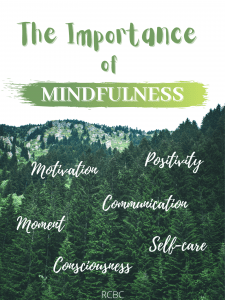By Communication Consultant Lili Tang (Accounting and BIS, ’22)
Are you familiar with meditating or practicing mindfulness? With the rapidly changing nature of our living environments, mindfulness practice has become an increasingly popular trend. It is usually defined as bringing one’s awareness and attention to the current moment while focusing on one’s feelings and thoughts. Do not let its seemingly abstract and profound concept scare you away. Mindfulness has real benefits for leaders and is proven to reduce stress in the workplace.
At this time of year, filled with exams and final projects, many of us are experiencing significant stress. Grace Brouillette’s studies focused on mindfulness in academic settings highlight barriers to self-care, including academic guilt, emotional and physical burn-out, and imposter syndrome. In addition, the current virtual environment creates more stress in our daily work and study. When our anxiety and stress levels go up, we tend to be easily trapped into an endless cycle.
Mindfulness can help you break that cycle. Although effectively mitigating and managing negativity takes time and effort, it is also true that we can see results right away when we recognize our positive and negative feelings, listen to them, and learn to embrace them gradually. Here are some mindfulness questions that you could ask yourself:
- What is/are the issue(s) you are dealing with and how do they make you feel?
- Why are you feeling stressed? What are some factors – internal or/and external – that are contributing to stress?
- Have such feelings/events occurred previously? If so, what action did you take back then? Was that action effective or ineffective?
- What would give you some comfort (nature, exercise, music, movies, books, cooking, etc.)? Who are you comfortable talking to?
Mindfulness is not merely applicable during stressful times. A regular practice in mindfulness carries numerous benefits. Understanding our own bodies and minds not only enhances our performance and communication, but also improves our memory, focus, and relationships.
Remember that mindfulness practice is not a monotonous task; rather, it is a valuable opportunity to communicate to yourself. If you are curious about the role of mindfulness in communication, do not hesitate to schedule an appointment with us. If you are stressed about exams, you could watch this brief meditation to help with test anxiety. If you are in distress or really need to talk with someone, make use of University Counseling Services.
Get information and resources about our center at The Philip Rauch Center for Business Communication.

